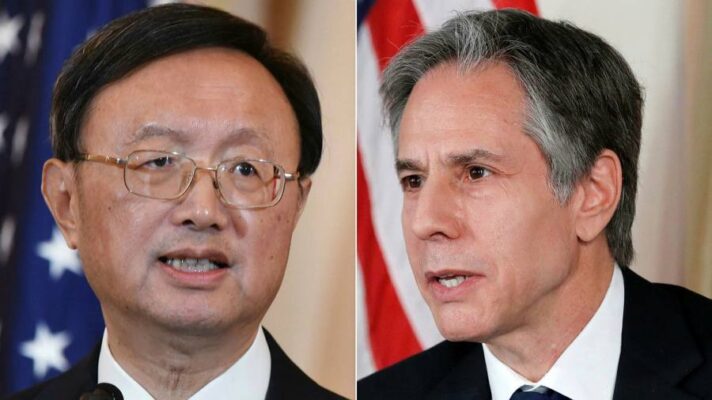
‘Genocide and crimes against humanity’, erosion of ‘democratic norms’ cited by Washington in call with Beijing.
![The US-China dialogue has been tense since Secretary of State Antony Blinken and China's top diplomat Yang Jiechi faced off in a diplomatic exchange in March [Frederic J Brown/Pool via Reuters]](https://www.aljazeera.com/wp-content/uploads/2021/06/2021-03-21_USA-CHINA.jpg?resize=770%2C513) The US-China dialogue has been tense since Secretary of State Antony Blinken and China’s top diplomat Yang Jiechi faced off in a diplomatic exchange in March
The US-China dialogue has been tense since Secretary of State Antony Blinken and China’s top diplomat Yang Jiechi faced off in a diplomatic exchange in March
United States Secretary of State Antony Blinken in a phone call with China’s top diplomat again voiced US concerns about the “ongoing genocide and ethnic cleansing” against Muslim Uigurs in China’s far western region of Xinjiang and “the deterioration of democratic norms” under China’s rule in Hong Kong.
Secretary Blinken spoke on Friday with Yang Jiechi, the Chinese Communist Party’s top foreign affairs officer, to discuss a range of thorny issues confronting the two major powers including North Korea’s nuclear programme, a State Department spokesman said.
Blinken’s comments to Yang follows the release on June 10 of a report by Amnesty International showing Xinjiang has become a “dystopian hell cape” where Uighurs and other predominantly Muslim ethnic minorities face systematic and state-organised “mass internment and torture amounting to crimes against humanity”.
Blinken’s conversation with Yang further comes as challenges posed by China figure in discussions now under way among leaders of the Group of Seven industrialised democracies in the United Kingdom and attended by President Joe Biden.
China has cracked down on pro-democracy advocates in Hong Kong, a former British colony returned to Chinese rule in 1997 under an agreed principle of “One China, Two Systems” that was to have allowed continuing democratic freedoms in Hong Kong.
In addition to “the need for the United States and the PRC to work together for the denuclearization of the Korean Peninsula,” Blinken and Yang discussed other “shared global challenges” including Iran, Myanmar and the climate crisis, State Department spokesman Ned Price said in a statement.
Blinken called for more “cooperation and transparency” from Chinese authorities in the World Health Organization’s continuing inquiries into the origin of the COVID-19 virus.
On the call, Yang expressed to Blinken Beijing’s serious concern that some people in the US were spreading the “absurd story” about the coronavirus escaping from a Wuhan laboratory, Chinese state media said.
Beijing firmly opposed what Yang called “abominable actions” over the pandemic, which he said were being used to slander China, state broadcaster CCTV said, according to the Reuters news service.
The US’s top diplomat called on Beijing to “cease its pressure campaign against Taiwan and peacefully resolve cross-Strait issues”, Price said. Yang told Blinken that Washington should handle Taiwan-related issues “carefully and appropriately,” CCTV reported.
Washington should work with Beijing to put ties “back on track,” Yang said, according to CCTV.
The US and China have been engaged in an increasingly tense diplomatic exchange since Blinken and Yang met face-to-face in Alaska in March. At the time, the US expressed “deep concerns” about actions by China, and China pushed back as “firmly opposed to US interference in China’s internal affairs”.
Bonnie Glaser, an Asia expert at the German Marshall Fund think-tank, told Reuters that although the agenda included potential areas of cooperation, the conversation appeared dominated by contentious issues.
She said Yang’s call for Washington to work with Beijing to put ties “back on track” indicated that China was still putting the onus on the US for the problems in the relationship.
Notwithstanding the diplomatic tensions, China’s largest ride-hailing company, Didi Chuxing, filed on Thursday for an initial public offering of stock on US financial markets in what is expected to be the world’s biggest IPO this year, Reuters reported.
The company is backed by Asia’s largest technology investment firms – SoftBank, Alibaba and Tencent. Sources familiar with the matter told Reuters that it could raise around $10bn and seek a valuation of close to $100bn.
At that valuation, Didi’s listing would be the biggest Chinese share offering in the US since Alibaba raised $25bn in 2014.
